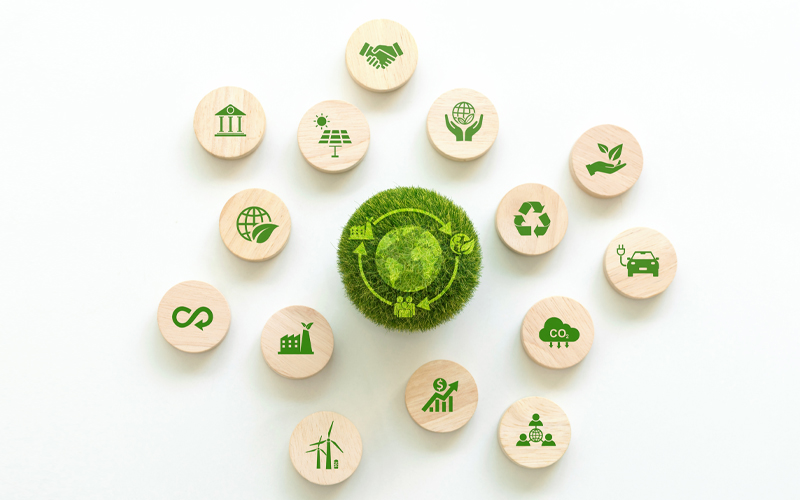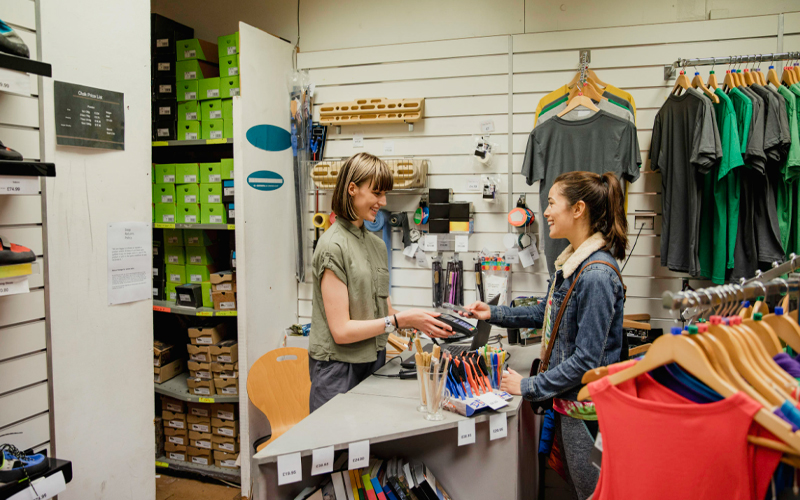The retail industry is undergoing a significant transformation as sustainability becomes a top priority for consumers. According to a study, over 73% of millennials are willing to pay a premium for products from sustainable retail brands that are committed to a positive environmental impact.
This shift compels retailers to rethink their strategies and integrate green retail solutions into their operations. From sourcing eco-friendly products to implementing renewable energy solutions and waste reduction strategies, sustainable retail brands are setting new standards for corporate sustainability.
By embracing sustainable retail practices, companies align with consumer values while enhancing long-term profitability and resilience in an evolving market.
Key retail sustainability trends
The retail industry is experiencing a shift towards sustainability, driven by evolving consumer expectations and environmental concerns. Key trends include:
Circular economy models
Reducing waste and maximising resource efficiency are key goals of a circular economy. Retailers are transitioning from the traditional linear economy model (take-make-dispose) to circular economy principles. This shift prioritises designing durable products, encouraging upcycling, and implementing efficient recycling strategies at the end of a product’s lifecycle.
By integrating circular economy practices, retailers can minimise waste, reduce costs, and provide an eco-friendly shopping experience.
Energy-efficient operations
Retailers are adopting environmentally friendly solutions to enhance sustainability and reduce operational costs. This includes using energy-efficient lighting, HVAC systems, and renewable energy. By investing in energy-efficient operations, retailers not only minimise their carbon footprint but also enhance long-term profitability and ensure compliance with evolving environmental regulations.
Many retailers are also leveraging smart technologies to optimise energy consumption, further driving efficiency and cost savings.
Eco-friendly packaging
Consumers are increasingly concerned about packaging waste and are demanding sustainable alternatives. In response, companies are investing in innovative packaging solutions that reduce plastic use and incorporate biodegradable materials.
Adopting minimalist and eco-conscious packaging not only enhances a brand’s image but also aligns with the values of sustainability-focused shoppers. Retailers that prioritise sustainable packaging gain a competitive edge and build stronger customer loyalty.
Implementing green retail solutions
Adopting effective green retail solutions requires a strategic and long-term approach. Below are the essential steps that businesses should take:
- Conduct sustainability assessments: Evaluate current practices and identify areas for improvement. These assessments provide valuable insights into energy consumption, waste management, and sourcing methods, helping businesses adopt more sustainable operations.
- Set clear goals: Establish sustainability goals that align with consumer expectations and regulatory standards. These goals should encompass all aspects of the business, including product development, supply chain practices, and waste management strategies, ensuring a comprehensive approach to sustainability.
- Engage stakeholders: Involve employees, suppliers, and customers in sustainability initiatives to foster a culture of environmental responsibility and drive meaningful change.
- Invest in innovation: Allocate resources to research and development for sustainable materials and eco-friendly practices. Investing in green technologies minimises carbon footprints and enhances brand value.
- Monitor and evaluate progress: Regularly assess sustainability initiatives using key metrics and consumer feedback. This iterative approach ensures strategies remain effective, aligned with industry standards, and adaptable to evolving needs, driving long-term success.
- Consumer education and engagement: Clear communication is essential for raising sustainability awareness. Retailers should implement loyalty programmes, transparent sustainability reporting, and educational campaigns to build trust and cultivate an eco-conscious customer base.
Challenges in adopting sustainable practices
While transitioning to sustainability presents significant opportunities, it also poses challenges:
- High initial costs: Sustainable initiatives often require substantial upfront investments in technology, materials, and processes, which can be a financial burden, especially for small and medium-sized retailers.
- Complex supply chains: Achieving sustainability across global supply chains is challenging. Retailers must work closely with suppliers to ensure compliance with environmental and ethical standards.
- Regulatory compliance: Adapting to evolving environmental regulations can be complex, particularly for retailers operating in multiple regions.
The future of green shopping
The future of retail lies in eco-conscious shopping. As consumers become more aware of sustainability, the demand for ethically sourced and environmentally friendly products will continue to grow.
To achieve long-term sustainability, retailers must integrate eco-friendly practices with advanced technologies and ethical business strategies. Implementing sustainable innovations, such as AI-driven supply chain optimisation and carbon footprint tracking, can help businesses stay ahead in an increasingly green market.
Retailers that embrace sustainability will not only future-proof their businesses but also contribute to a more responsible global economy.
How can Infosys BPM help?
The transition to sustainability in retail is no longer just an ethical consideration—it is a strategic imperative that aligns with evolving consumer expectations. To stay competitive in an increasingly eco-conscious market, retailers must embrace sustainable practices and implement green retail solutions.
As companies navigate this journey, partnering with the right service provider can facilitate success. Infosys BPM supports retailers through comprehensive services, leveraging advanced technologies and process optimisation to implement effective green retail solutions.
Explore Infosys BPM green retail solutions to enhance efficiency and meet consumer demand for sustainability.







